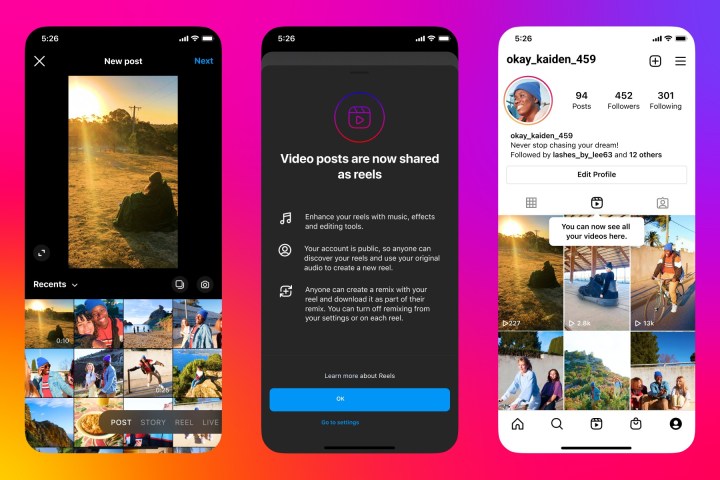Popular social media service Instagram is reconsidering its pivot to a TikTok-style video feed after recent changes proved to be highly unpopular with its fan base.
Over the past several weeks, Instagram has been testing a version of the app that opened into a feed of full-screen photos and videos, seemingly attempting to morph the service into something that more closely resembles TikTok. Similarly, the new feed also disproportionately pushes seemingly random “recommended” posts, squeezing out content from those folks that Instagram users have actually chosen to follow.

Instagram chief Adam Mosseri has now announced that the social media platform will “take a big step back and regroup.” Mosseri announced the reversal in an interview with The Verge’s Casey Newton, adding, “I’m glad we took a risk — if we’re not failing every once in a while, we’re not thinking big enough or bold enough.”
Mind you, this isn’t a permanent retreat, and Mosseri clarifies that Instagram plans to “work through” and learn from the changes to “come back with some sort of new idea or iteration.” For now, the social media service is phasing out the full-screen test version of the app and temporarily reducing the number of recommended posts and accounts. However, the goal is to fine-tune its personalization algorithms and try again with a feed that will delight users by providing more relevant recommendations.
“When you discover something in your field that you didn’t follow before, there should be a high bar — it should just be great. You should be delighted to see it,” Mosseri told Newton, acknowledging that’s not happening right now.
Make Instagram Instagram again
Perhaps not surprisingly, those changes resulted in a massive backlash from fans that weren’t happy with what their favorite social media service is becoming. Twitter is rife with Tweets from frustrated users that quickly accumulate tens of thousands of likes and retweets, and major celebrities like Kylie Jenner and Kim Kardashian have weighed in, insisting that parent company Meta “Make Instagram Instagram again.”
If Kylie Jenner speaks it, your platform is in trouble. Never forget snap losing over $1 billion when she said she didn’t open Snapchat anymore (in 2018) bc of the redesign pic.twitter.com/jkmAuWoFen
— Ashley Carman (@ashleyrcarman) July 25, 2022
However, it wasn’t merely the public outcry that made Instagram take a step back and undo these changes. The company’s own analytics also proved how unpopular the new design was in practical terms. While nearly all social media is seeing a shift from photos to video, Instagram may have moved too impulsively. Mosseri said the “high-profile dissatisfaction” was supported by Instagram’s own internal data. However, the most intense criticism appears to center on the design changes.
The new Instagram update really understood what I was looking for:
– none of my friends’ content
– reposted TikToks from meme accounts I do not follow
– 100x more ads
– everything played at full volume against my will— Meg Watson (@msmegwatson) July 14, 2022
“For the new feed designs, people are frustrated, and the usage data isn’t great,” Mosseri told The Verge. “So there I think that we need to take a big step back, regroup, and figure out how we want to move forward.”
One thing that seems clear, though, is that Instagram’s pivot to video isn’t going away. In a recent earnings call, Mark Zuckerberg shared that the time people spent watching Reels grew by 30% in the past quarter. There’s clearly a demand for algorithmically-recommended short-form video, and Meta will continue working to give it a prominent place on both Facebook and Instagram. The biggest challenge for Mosseri and his team will be how to fit it into the app in a way that complements the Instagram experience rather than detracting from it.



